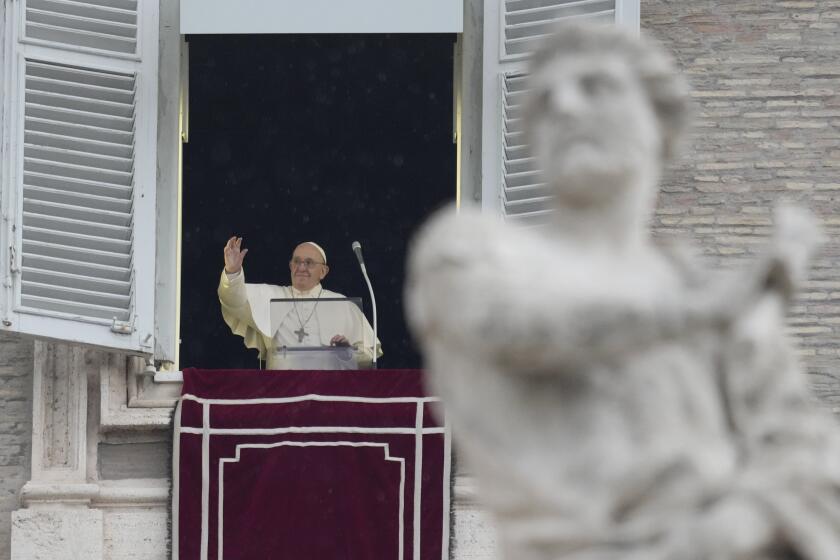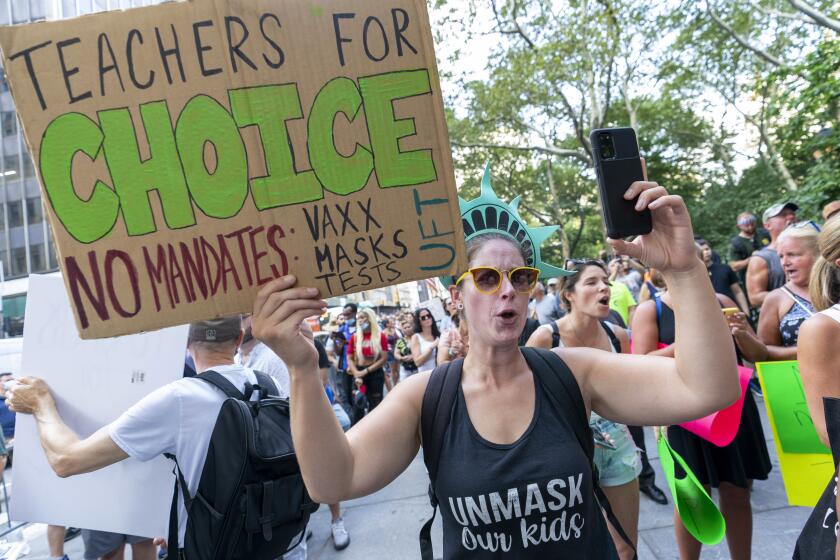Online pastors, form letters: The cottage industry helping workers avoid vaccine mandates
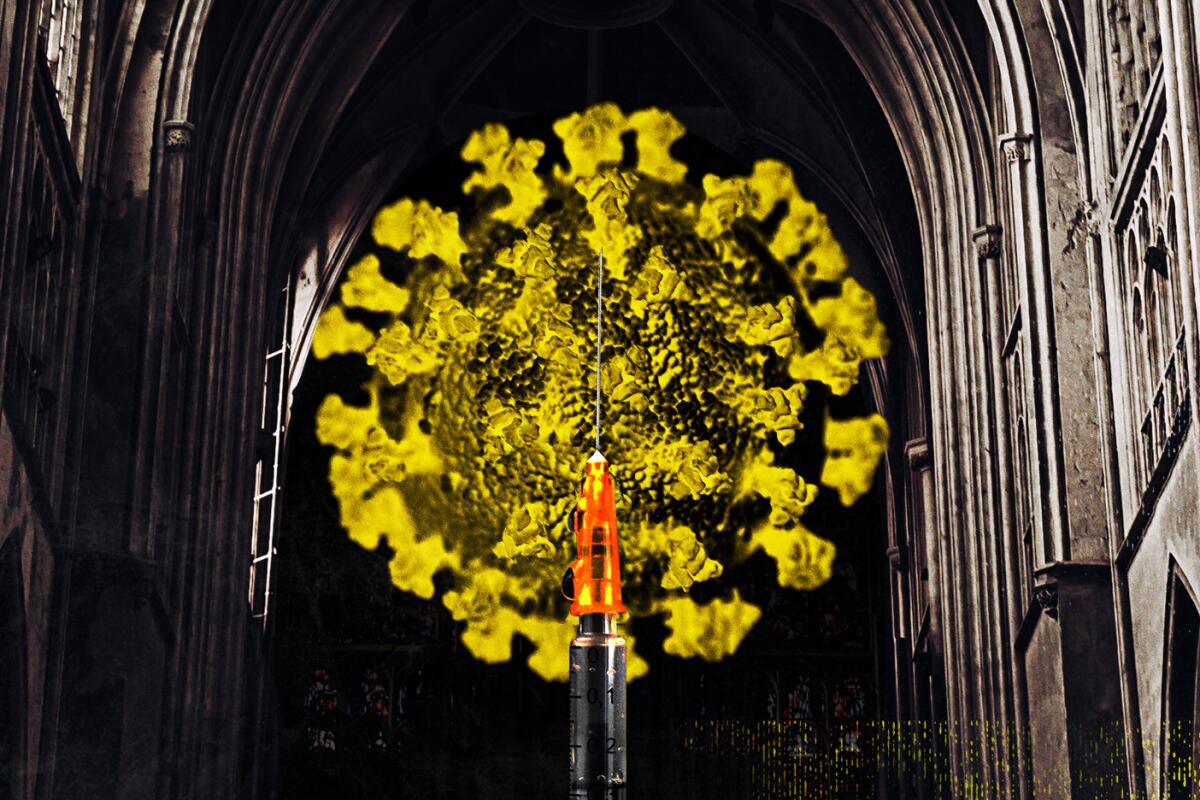
- Share via
The request arrived at the Los Angeles Department of Water and Power in early September.
Written on letterhead with a gold seal, it warned the city agency that forcing an employee to wear a mask, get tested or be vaccinated against COVID-19 would be an “affront to a Christian” and a violation of federal laws that ban religious discrimination.
The document looked and sounded official. It was signed by the pastor of True Hope Ministry in San Clemente.
It can be purchased online for $195 as part of a vaccine exemption “concierge program.”
That letter, and others like it, have become go-to tools for California employees seeking exemptions from workplace vaccine mandates. They raise questions about what constitutes a deeply held religious belief, how those beliefs should be expressed and what employers can do about a request that may not be sincere.
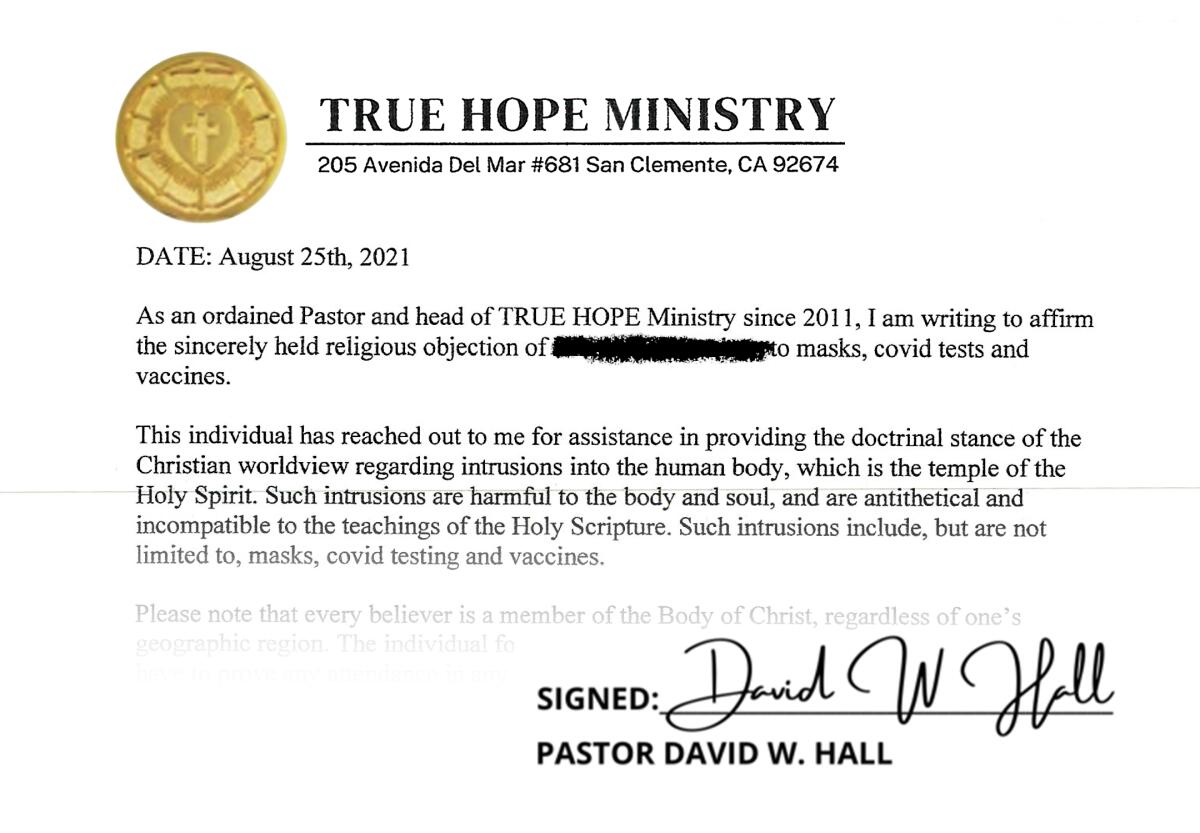
Through public records requests, The Times amassed more than 2,200 pages of emails, letters and other records related to religious waivers from vaccine rules. The documents, from four public employers, show just how complicated it can be to review vaccine exemption requests. They also reveal a cottage industry that has sprung up to help people justify decisions to refuse vaccination.
Some employees at the DWP, the Orange County Sheriff’s Department and two Southern California school districts cited Scripture and described their relationships with their faith. But the majority of exemption requests reviewed by The Times were copied from letters posted on websites of evangelical churches, conservative legal groups and fee-based organizations such as True Hope Ministry.
Several letters reviewed by The Times included statements identical to those on the website of Defending the Republic, a Texas organization led by Sidney Powell, a conspiracy theorist and lawyer connected to former President Trump. Others lifted language from anti-vaccination groups such as Children’s Health Defense — chaired by Robert F. Kennedy Jr. — and America’s Frontline Doctors.
Children’s Health Defense has raked in funding and followers as Robert F. Kennedy Jr. used his star power.
Form letters may help some devout people articulate complicated but legitimate views, said Dorit Reiss, a professor at UC Hastings College of the Law who studies legal issues related to vaccines. But, she said, it’s likely that many copy-and-paste exemptions are simply a means to an end.
“It seems that many of these people were not acting for sincere religious reasons,” Reiss said. “They didn’t want to vaccinate and went looking for something that sounds convincing as a way to get out of it.”
Most requests were written by Catholics and evangelical Christians. A few employees described themselves as Mormon, Syrian Orthodox, Christian Scientist, Muslim and Buddhist. One cited a “holistic faith lifestyle.”
Most employees’ names and other sensitive information were redacted by the agencies that provided the records.
Some letters, including the one from True Hope Ministry, included incorrect information and raised concerns about the vaccine that were not related to religion. Others were written by pastors who described the employees as members of their online congregations who could not be vaccinated because of their faith.
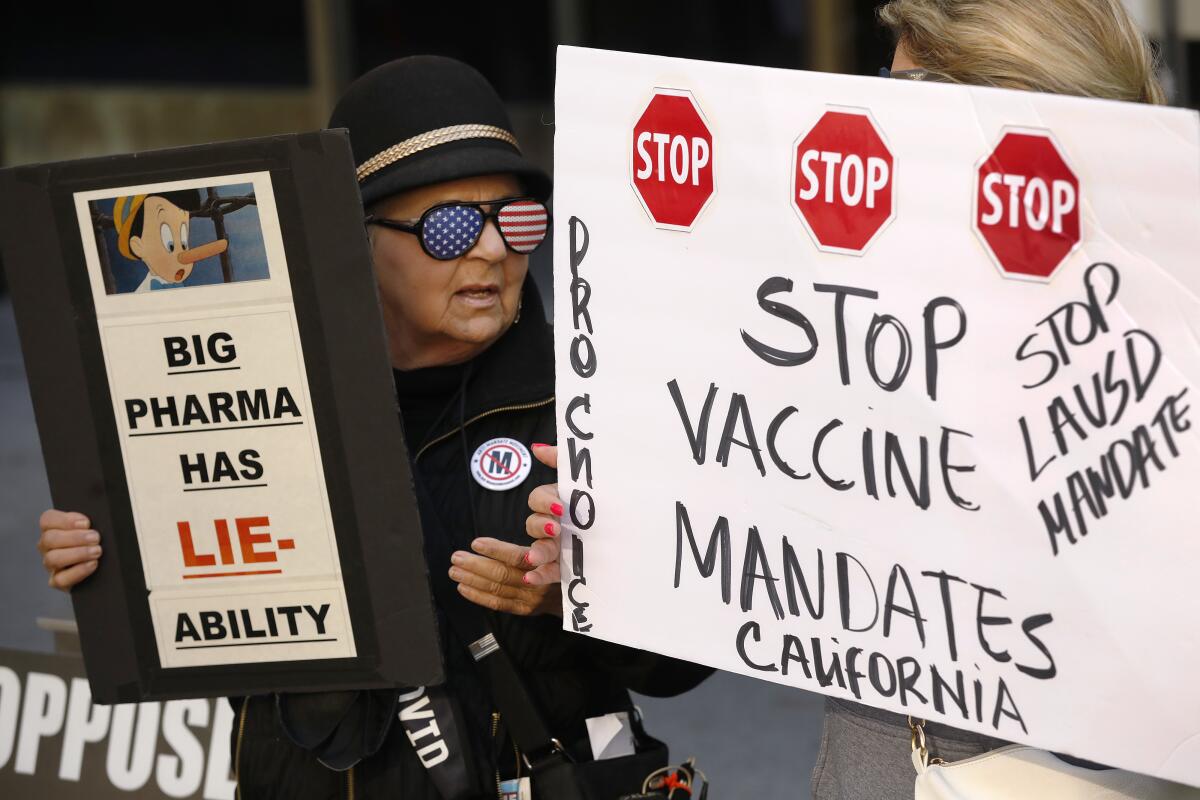
Challenging those letters, even when they’re copied from the internet or written by an out-of-state religious leader, can be a legal minefield.
State and federal laws, including the Civil Rights Act of 1964, have created strong protections for workplace religious freedom. The law requires employers to provide reasonable accommodation for workers whose “sincerely held religious beliefs” conflict with workplace policy unless doing so would pose an undue hardship.
Employees do not need to be devout, legal experts say. Their beliefs do not need to be long-standing or mainstream. They do not need to identify with a religion, and if they do, they do not need to share the views of those religions’ leaders. (The leaders of the world’s biggest religions, including the Roman Catholic Church’s Pope Francis, have spoken in favor of vaccination.)
That expansive view of personal belief has also created a vast loophole that can be exploited.
“It is ripe for abuse, and it is being abused,” said Nancy Inesta, a labor and employment partner at the BakerHostetler law firm in Los Angeles.
Francis uses some of his strongest language yet in calling for people to get vaccinated and denounces the ‘baseless information’ dissuading some.
The content of exemption letters varies, but the goal is the same: helping employees explain that a vaccine rule conflicts with their religious beliefs. Many pastors, priests, lawyers and advocates are happy to oblige.
Just after midnight Aug. 4, a worker in a hospital emergency department wrote an email to Liberty Counsel, a conservative legal group based in Florida. The employee wrote that the use of “aborted babies to develop, test and produce” the COVID-19 vaccine was immoral but that they did not “feel wise enough to answer the questions” on a vaccine exemption request form.
The next day, the Liberty Counsel’s vice president of legal affairs responded with a five-paragraph statement.
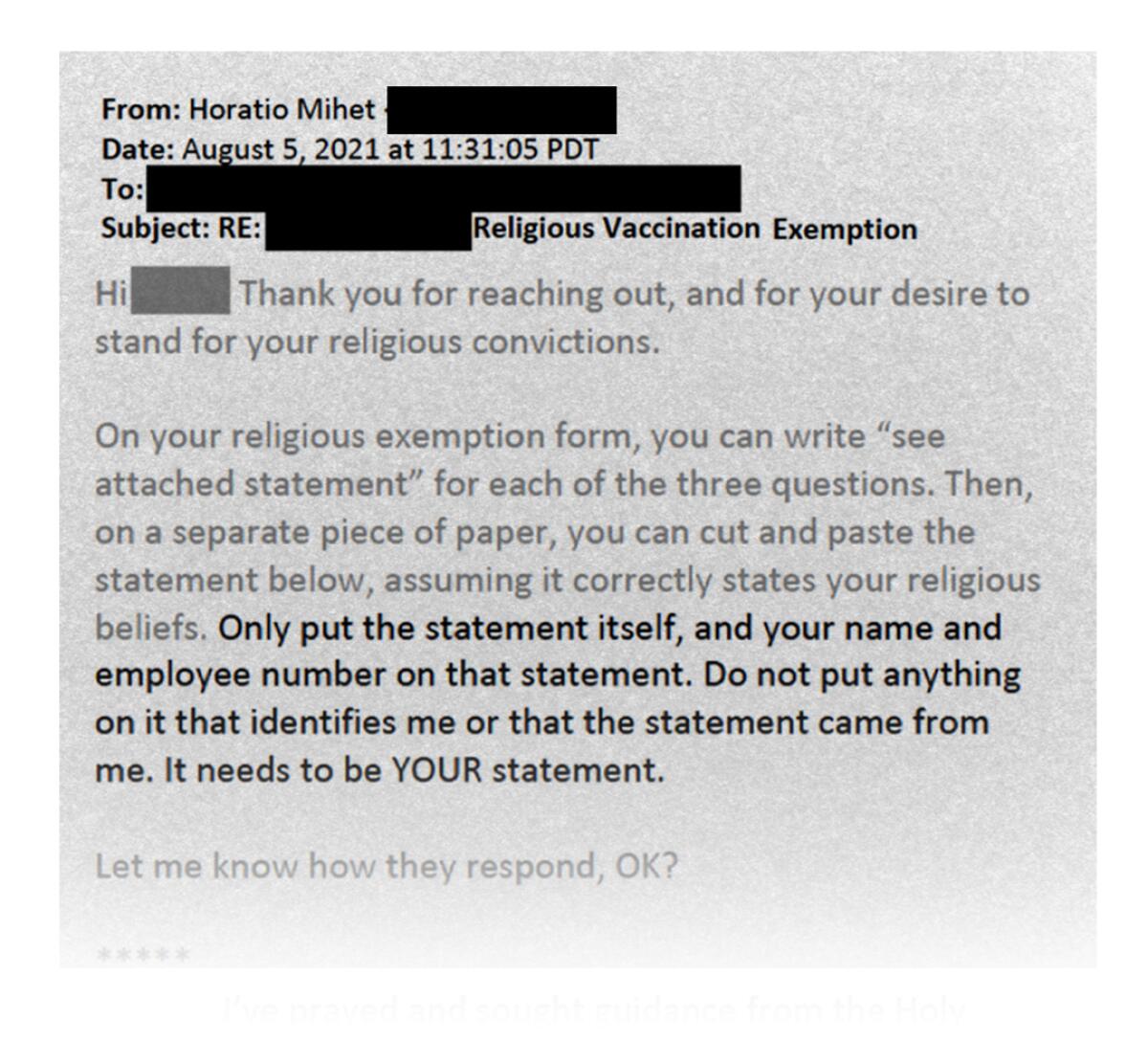
“Cut and paste the statement below, assuming it correctly states your religious beliefs,” Horatio Mihet wrote. “Do not put anything on it that identifies me or that the statement came from me. It needs to be YOUR statement.”
The employee’s email and Mihet’s response were forwarded multiple times, eventually landing in the inbox of an Orange County Sheriff’s Department employee.
Written in the first person, the statement asked for a vaccine waiver so “I am not forced to sin and stain my conscience.” The statement noted the employee’s concern with fetal cell lines, then added an idea the employee hadn’t mentioned: an objection to “any other product or medication that is connected to abortion in the same way.”
Mihet said in an email that “Liberty Counsel provides free assistance to help employees articulate their own religious beliefs” and that the practice is not “improper.”
“Attorneys routinely draft first-person statements, affidavits, declarations, etc. for their clients, which are adopted by the clients and filed as their own sworn statements in various proceedings,” he said.
In the records obtained by The Times, many employees said they objected to the vaccine because they saw abortion as a mortal sin.
The connection between abortion and the COVID-19 vaccine is tenuous. Some of the vaccines were tested and developed using cells derived from the tissue of fetuses aborted more than three decades ago. Such cell lines have been used to help create vaccines for chickenpox, rubella and hepatitis A.
Cells isolated from fetal tissue also have been used in the development of more than 30 medications, including aspirin, ibuprofen, Tylenol, Tums, Benadryl and Preparation H. One hospital chain in Arkansas asked employees seeking vaccine exemptions to attest that they won’t use those medications.
No COVID-19 vaccine contains aborted fetuses or fetal cells.
Subscribers get early access to this story
We’re offering L.A. Times subscribers first access to our best journalism. Thank you for your support.
Other form letters listed concerns not rooted in religion — or fact. A letter from Joshua Springs Calvary Church in Yucca Valley inaccurately described the COVID-19 vaccines as “gene therapy” and wrongly said asking employees to disclose their vaccination status was a violation of the Health Insurance Portability and Accountability Act. The True Hope Ministry letter wrongly asserted that the vaccine contains “the DNA of a male aborted baby.” A Northern California Pentecostal church falsely claimed that the vaccines contain “animal parts.”
On Oct. 1, a history teacher at El Camino Real High School in Placentia sent an email to the nondenominational Calvary Chapel Chino Hills asking for help with a religious exemption from the vaccine. He and his family attend another church, he wrote, but believed that Calvary Chapel would have “more resources to help us.”
“We trust in Jesus, but we don’t know how to go about this and are really hoping you can help,” the message read.
Thirteen minutes later, the church responded with a link to an exemption request template and contact information for a lawyer at the Pacific Justice Institute, a conservative legal group based in Sacramento. The email also invited him to “pick up a signed exemption form” from the church’s office.
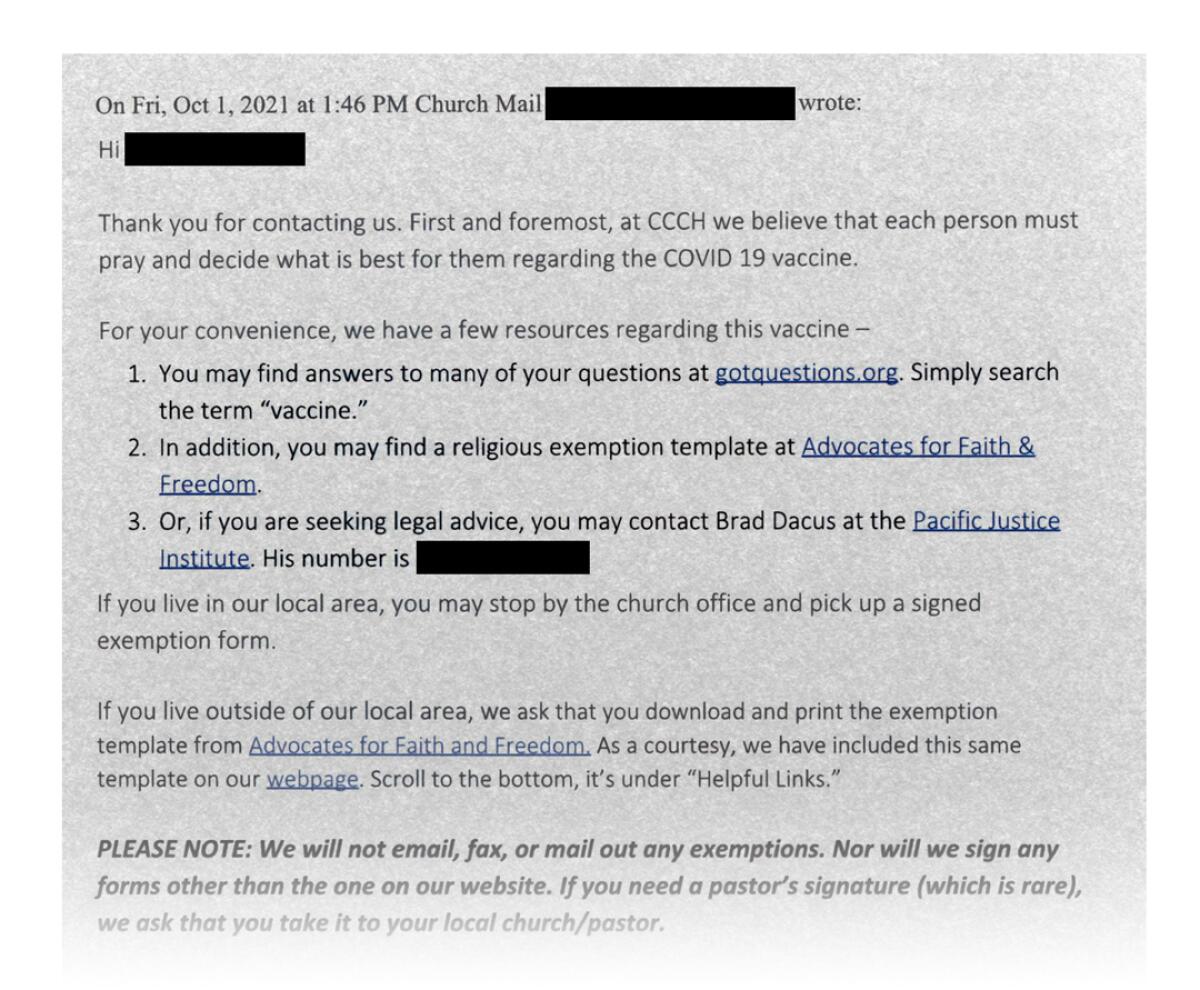
The records do not indicate whether the hospital worker or the history teacher ultimately received exemptions. Calvary Church Chino Hills declined to comment.
Trying to determine whether someone’s request for a religious exemption is based on a legitimate, deeply held belief is “the most challenging part” of any workplace vaccination requirement, said Yvette Lee of the Society for Human Resource Management, a trade group.
Employers are generally supposed to assume a worker’s request for religious accommodation is sincere. The law does not require accommodation for personal preferences or political views.
If something about a religious exemption request seems off — for example, if an employee already tried to get out of vaccination for nonreligious reasons — the employer can perform a “limited factual inquiry,” according to the U.S. Equal Employment Opportunity Commission. That can include asking an employee for additional information, such as an explanation of how the policy conflicts with their beliefs.
Lee said employers in the Golden State, where the Fair Employment and Housing Act also applies, should “tread more lightly” and bring in legal counsel if they intend to seek that information.
Employers should ask those questions, said Inesta, the employment lawyer, but some have been “gun-shy.”
She said she recently reviewed a case involving an employee who requested a religious exemption but had posted on social media about resisting vaccine mandates and standing up for individual freedom. Sprinkled in were a few posts about religion, so she cautioned the employer to tread carefully.
“For every 10 people who are abusing this system, there is going to be someone who has a sincerely held religious belief,” Inesta said.
No major religions denounce vaccination. That hasn’t kept individual churches from providing religious “cover” for those seeking to avoid jabs.
Faith and science do not have to be an “either/or” question, said Drs. Tim Millea and Craig Treptow of the Catholic Medical Assn. “Our faith is a ‘both/and’ commitment that thrives on the beliefs of our faith in concert with logic and reason.” Mandates that don’t allow for the “least restrictive” path to accomplishing pandemic goals are not the answer, they said.
There’s nothing “inherently wrong or dishonest” about people turning to spiritual leaders and lawyers to help explain their religious beliefs and how they play into their vaccination decisions, said Eugene Volokh, a 1st Amendment law professor at UCLA School of Law.
“It makes sense that somebody would want to have something in writing,” he said. “The employer might say, ‘I don’t believe this, it’s all nonsense to me, but I believe the employee probably believes it, and if we went to court, the jury would probably think that the employee believes it.’”
The Orange County Sheriff’s Department has approximately 4,000 employees; 727 of them were subject to the vaccination requirement as of mid-December, said Veronica Musico with the agency’s public records unit. The department had granted 342 religious exemptions and three medical exemptions as of Thursday, she said, and does not track how many requests it denies.
Those seeking an exemption need to explain how “sincerely held religious beliefs, practices or observances” preclude them from getting inoculated, said Sgt. Todd Hylton, a department spokesman. “If a person just said, ‘It’s a personal belief, I don’t believe in vaccines so I don’t want to do it,’ then it wouldn’t meet that qualification.”
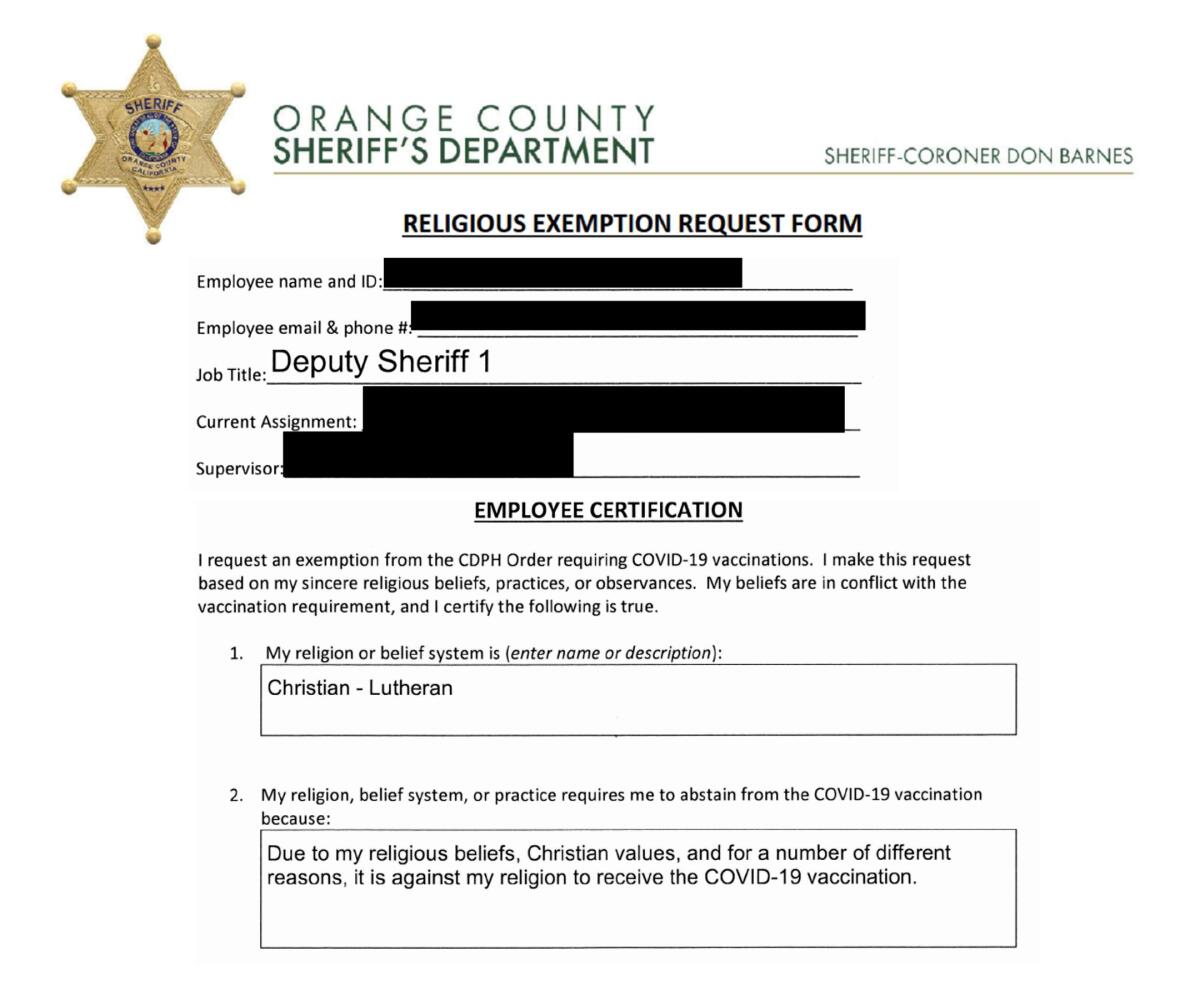
The calculus changes when allowing employees to remain unvaccinated could put other people at risk — if, for instance, they work in a nursing home. Religious freedom must be weighed against the harm the accommodation could cause others, said Lindsay Wiley, a health law expert and professor at UCLA School of Law.
Employers can also refuse to accommodate an employee’s religious beliefs if doing so would cause “undue hardship.” In most parts of the country, that’s not a very high bar, Volokh said.
“The courts have said that anything more than a minimal cost to the employer is an undue hardship,” he said.
But turning down a request for a vaccine exemption still carries significant legal risk.
The threat of a religious discrimination lawsuit is a common theme on the website of the Healthy American, which sells classes and consulting packages on how to secure a religious exemption. Creator Peggy Hall, a vocal Orange County anti-mask advocate, posts free YouTube and Facebook Live videos about how to avoid workplace vaccine mandates.
The site’s concierge program, which includes access to weekly group calls and a signed True Hope Ministry letter from David Hall, costs $195. A “VIP package,” which promises a 20-minute call with the Halls, costs $495. Their website advertises a class on Tuesday night that will touch on subjects including, “What if they say, ‘You got this off the internet.’”
David Hall said in an email that the Healthy American website has helped thousands of people fight “unlawful discrimination in the workplace.”
He also challenged the characterization that the True Hope Ministry letter is for sale. It is part of the site’s “private classes that provide an in-depth education on civil rights,” he said, along with spiritual counsel and an “attestation of faith that describes how vaccines, masks and testing are an affront to a Bible-believing Christian.” He said every person who “joins our program becomes a member of True Hope Ministry.”
Hall, who describes himself as a pastor, said he was “ordained by the Holy Spirit under the authority of Jesus Christ” and preaches at a monthly San Clemente beach church gathering.
Some of the communications reviewed by The Times had a lighter side. One water distribution worker at the DWP notified the agency they intended to seek a religious exemption, then mentioned they had a dairy allergy too.
A deputy sheriff at the Orange County Sheriff’s Department asked for a religious waiver, then requested special dispensation to wear a merino wool neck gaiter instead of a surgical mask because the fabric is “naturally anti-bacterial, does not trap heat or moisture, is naturally odor resistant.”
Another Orange County sheriff’s deputy seemed to understand how prevalent the copy-and-paste messages had become within the department. In a request for a religious exemption, the deputy wrote of a deeply held belief in Christianity and that their family had prayed on the issue of vaccination.
“I knew the day would come where I would have to write this statement,” the message said. “I could’ve easily downloaded a religious exemption template off the internet and put my name on it, but that’s not who I am.”
More to Read
Sign up for Essential California
The most important California stories and recommendations in your inbox every morning.
You may occasionally receive promotional content from the Los Angeles Times.

